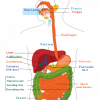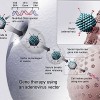Posts tagged gene therapy

Guts against Diabetes
Mar 21st
For a very long time I have been using Diabetes as an example of a disorder that is caused by a mutation in the insulin gene. This mutation would stop the cells from making insulin, and a diabetic might need daily insulin injections to regulate their sugar levels properly. I don’t know what took me so long to realize that this was completely wrong. That while some diabetics are insulin dependent, it is because their insulin-producing cells of the pancreas are being completely destroyed by the immune system. And while they still aren’t sure about why these cells are being More >

Merry Christmas to Hemophilia Patients
Dec 15th
Gene therapy is a technique that offers the potential to replace defective copies of genes in any genetic disease with an intact version. While the idea of this treatment sounds alluring, the actual practice of it is a whole other story. There are a few drawbacks to this technique that must be considered, including the potential risk of an immune response because the gene is inserted with the use of a virus, which the immune system will see as foreign. Also, most patients so far have needed multiple treatments over the course of their lifetime, estimating to cost much more More >

The Medical Sleuth
Oct 31st
When we think of a detective the first thing that comes to mind is an investigator, either a member of a police agency or a private entity. However there are unique detectives within the multifaceted arena of medicine. All though we might already think of most doctors as detectives there are special doctors, units, working at the National Institute of Health’s (NIH) undiagnosed disease program. Doctors such as William A. Gahl at the NIH are disease detectives that try to elucidate the causes and genetic basis involved in the hundreds of unsolved and mysterious diseases that arise each year. Dr. Gahl More >

Getting an edge on breast cancer
Feb 3rd
Cancer is a life threatening disease characterized by uncontrolled growth of cells coupled with malignant behavior. The causes leading to cancer are believed to be genetic, environmental, or a combination of the two. Chemotherapy is one of a number of treatments for cancer. It utilizes a regiment of chemicals toimpair cell division and/or induce programmed cell death.
Research carried out by Dr Yang Li and colleagues at Harvard Medical School, the Technical University of Denmark, and the Université Libre de Bruxelles, have highlighted two genes – LAPTM4B and YWHAZ – that may inhibit the response of anthracycline-based adjuvant chemotherapy for breast More >
